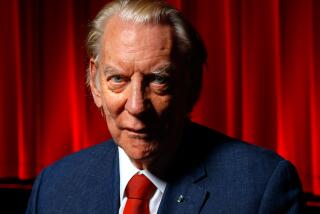Sutherland Kept Right on Teaching : Ordeal: Friends were right about the headstrong professor’s character. He gave language lessons to fellow hostages.
- Share via
WASHINGTON — Even before his release, Thomas M. Sutherland’s friends and colleagues believed that his “irrepressible” personality and well-known “stubborn” streak would either help him survive his years in captivity or make his ordeal worse.
In either case, they were certain the headstrong professor of Scottish descent would remain true to his nature, despite being held hostage by terrorists in Lebanon.
Word that had leaked out of Lebanon during his years of captivity indicated that they were right about his strength of character. Sutherland, 60, released Monday after being held for nearly 6 1/2 years, never stopped behaving as a teacher, refused to comply with his captors’ demands and even conducted foreign language classes for fellow hostages during their confinement, said Joel Kassiday, an aide to Sen. Hank Brown (R-Colo.).
A native of Glasgow, Scotland, Sutherland holds American citizenship and is on the faculty at Colorado State University in Ft. Collins. He lived in the small college community with his wife, Jean, and three daughters before accepting a temporary assignment at the American University of Beirut in the summer of 1983. He had taught previously at Iowa State University.
Those who know Sutherland well said his upbringing in Scotland provides the best clue to his personality. He has always been fiercely independent and had developed a scholarly mien--two qualities that they had feared would antagonize his kidnapers to the point of physically mistreating him.
Kassiday said that Brown’s office had obtained from the State Department some evidence of “rough times” experienced by Sutherland during his captivity. But his daughter, Joan, who watched her father’s news conference on television from Portland, Ore., remarked later that he appeared to be in “wonderful” condition.
Sutherland’s stubborn streak exposed itself during an interview with The Times three months before his kidnaping. He said then that despite the danger in Lebanon, he had no plans to leave. His resolution was firm, although two colleagues at the university in Beirut had been victims of the violence that plagued the city: American University President Malcolm Kerr was assassinated Jan. 18, 1984, and Prof. Frank Regier was kidnaped the following month.
“When you’re teaching class, you can’t pay any attention” to the gunfire, then commonplace in Beirut. “Otherwise you lose the attention of the students, and they get worried and want to leave,” he told The Times.
Sutherland was kidnaped June 9, 1985, by gunmen who called themselves Islamic Jihad, or Islamic Holy War, a shadowy terrorist group that later claimed to hold Sutherland along with several other hostages, including Briton Terry Waite, also released Monday, and American Terry A. Anderson, who remains in captivity. The group also held former hostage David P. Jacobsen, who was seized in May, 1985, and released 17 months later.
At the time of his abduction, Sutherland was the ninth American to have been kidnaped in a rash of seizures of foreigners that began in Lebanon in February, 1984, and the fourth member of the faculty of the American University to be abducted.
According to reports, Sutherland was seized on a Sunday about 6:30 p.m. by five or six gunmen in two cars, who shot out the tires of a limousine driving him from the Beirut airport. The car belonged to university President Calvin Plimpton, fueling speculation at the time that the kidnapers had wanted to abduct Plimpton.
Sutherland had just returned to Lebanon after attending his daughter’s college graduation in the United States. University officials said at the time that he had insisted on returning to the school to prepare for final exams and to help with summer session classes.
In his book, “Hostage: My Nightmare in Beirut,” Jacobsen said Sutherland feared that their captors were convinced that he was a CIA operative. That misperception stemmed from his deliberate mannerisms and the contents of his briefcase when he was captured--letters to fellow Westerners, a small camera and an article about Islamic fundamentalists.
“Our captors apparently never quite relinquished their suspicion that Sutherland was something more than a simple academician,” Jacobsen wrote. “In the mind of the kidnapers, he was being evasive. In truth, the man was simply being honest. A direct yes or no struck him as an oversimplification, something that went against his nature.”
Kassiday, who got to know Sutherland while attending Colorado State as a student in the early 1970s, said that the professor “has an irrepressible personality and I can’t imagine him cooperating with his captors. He’s a very stubborn Scotsman, and I suspect he would tell them to go to hell.”
Janet Johnson, an environmental health professor at Colorado State and close friend of the Sutherland family, described Sutherland as “an extremely bright man, superb teacher and researcher . . . (possessing) a tremendous sense of humor, wonderful smile and a twinkle in his eye.” She said he is proud of his Scottish heritage.
“You could tell that by listening to him quote Robert Burns,” she said. “And he has a great singing voice and would entertain us by singing Scottish songs.”
Johnson said that her family and the Sutherlands vacationed together and that her daughters, who grew up with the Sutherland girls, thought he was “perfect.”
“Tom has always been fun,” she said. “He is good company. I hate to put him up on a pedestal because he’s a real person. He isn’t perfect, but then none of us are perfect.”
More to Read
Sign up for Essential California
The most important California stories and recommendations in your inbox every morning.
You may occasionally receive promotional content from the Los Angeles Times.













